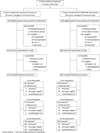Clinical effectiveness of integrating depression care management into medicare home health: the Depression CAREPATH Randomized trial
- PMID: 25384017
- PMCID: PMC4516039
- DOI: 10.1001/jamainternmed.2014.5835
Clinical effectiveness of integrating depression care management into medicare home health: the Depression CAREPATH Randomized trial
Abstract
Importance: Among older home health care patients, depression is highly prevalent, is often inadequately treated, and contributes to hospitalization and other poor outcomes. Feasible and effective interventions are needed to reduce this burden of depression.
Objective: To determine whether, among older Medicare Home Health recipients who screen positive for depression, patients of nurses receiving randomization to an intervention have greater improvement in depressive symptoms during 1 year than patients receiving enhanced usual care.
Design, setting, and participants: This cluster randomized effectiveness trial conducted at 6 home health care agencies nationwide assigned nurse teams to an intervention (12 teams) or to enhanced usual care (9 teams). Between January 13, 2009, and December 6, 2012, Medicare Home Health patients 65 years and older who screened positive for depression on routine nursing assessments were recruited, underwent assessment, and were followed up at 3, 6, and 12 months by research staff blinded to intervention status. Patients were interviewed at home and by telephone. Of 502 eligible patients, 306 enrolled in the study.
Interventions: The Depression Care for Patients at Home (Depression CAREPATH) trial requires nurses to manage depression at routine home visits by weekly symptom assessment, medication management, care coordination, education, and goal setting. Nurses' training totaled 7 hours (4 onsite and 3 via the web). Researchers telephoned intervention team supervisors every other week.
Main outcomes and measures: Depression severity, assessed by the 24-item Hamilton Scale for Depression (HAM-D).
Results: The 306 participants were predominantly female (69.6%), were racially/ethnically diverse (18.0% black and 16.0% Hispanic), and had a mean (SD) age of 76.5 (8.0) years. In the full sample, the intervention had no effect (P = .13 for intervention × time interaction). Adjusted HAM-D scores (Depression CAREPATH vs control) did not differ at 3 months (10.5 vs 11.4, P = .26) or at 6 months (9.3 vs 10.5, P = .12) but reached significance at 12 months (8.7 vs 10.6, P = .05). In the subsample with mild depression (HAM-D score, <10), the intervention had no effect (P = .90), and HAM-D scores did not differ at any follow-up points. Among 208 participants with a HAM-D score of 10 or higher, the Depression CAREPATH demonstrated effectiveness (P = .02), with lower HAM-D scores at 3 months (14.1 vs 16.1, P = .04), at 6 months (12.0 vs 14.7, P = .02), and at 12 months (11.8 vs 15.7, P = .005).
Conclusion and relevance: Home health care nurses can effectively integrate depression care management into routine practice. However, the clinical benefit seems to be limited to patients with moderate to severe depression.
Trial registration: clinicaltrials.gov Identifier: NCT01979302.
Conflict of interest statement
Conflict of Interest Disclosures: Dr. Bruce reported receiving personal fees for consultation from McKesson and other support from Medispin. Dr. Pickett reports receiving salary from Montefiore Medical Center’s Department of Psychiatry. Ms. Zukowski reports receiving personal fees from Zone Program Integrity Contracts (ZPIC). No other authors reported conflicts of interest.
Figures


Comment in
-
Now is the time for true reform of mental health services.JAMA Intern Med. 2015 Jan;175(1):65-6. doi: 10.1001/jamainternmed.2014.6086. JAMA Intern Med. 2015. PMID: 25383616 No abstract available.
References
-
- Bruce ML, McAvay GJ, Raue PJ, et al. Major depression in elderly home health care patients. Am J Psychiatry. 2002 Aug;159(8):1367–1374. - PubMed
-
- Raue PJ, Meyers BS, McAvay GJ, Brown EL, Keohane D, Bruce ML. One-month stability of depression among elderly home-care patients. Am J Geriatr Psychiatry. 2003 Sep-Oct;11(5):543–550. - PubMed
-
- Raue PJ, Meyers BS, Rowe JL, Heo M, Bruce ML. Suicidal ideation among elderly homecare patients. Int J Geriatr Psychiatry. 2007 Jan;22(1):32–37. - PubMed
Publication types
MeSH terms
Associated data
Grants and funding
LinkOut - more resources
Full Text Sources
Other Literature Sources
Medical

